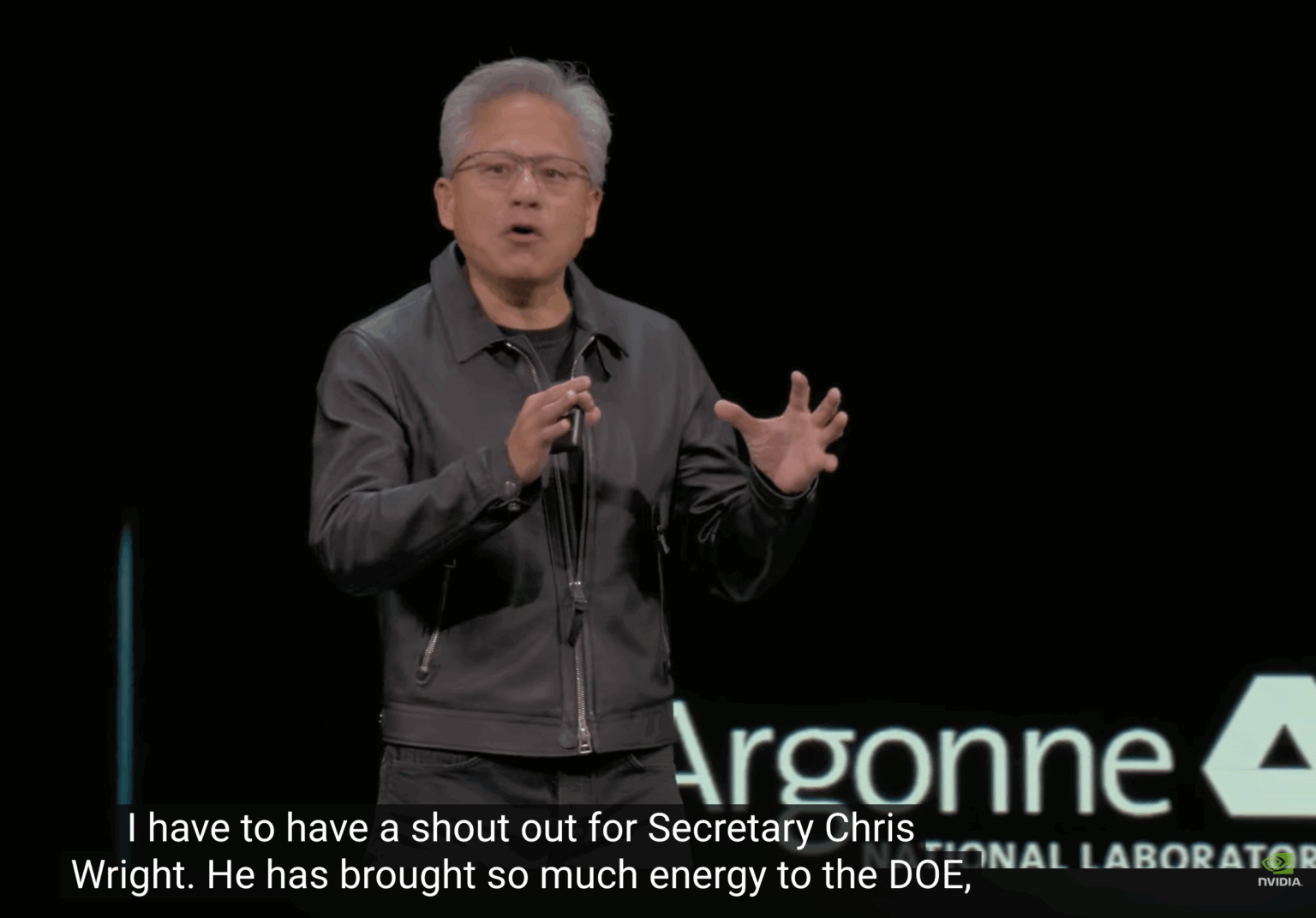Jensen Huang, the CEO of supercomputer chip-maker Nvidia, has for years claimed that his company’s artificial intelligence products, as some of the most advanced scientific tools in history, will help the world solve climate change, warning last year that “climate disasters are now normal.”
Yet Huang is now loudly cozying up to U.S. Energy Secretary Chris Wright, even though Wright is fully on board with the Trump administration’s climate denial policies.
A so-called “climate science” report Wright’s Department of Energy released in July has been condemned by scores of scientists as “biased, full of errors, and not fit to inform policymaking.” The report is part of the administration’s effort to overturn the scientific basis for regulating greenhouse gas emissions as pollution — the 2009 endangerment finding — under the Clean Air Act.
Yet Huang, whose firm recently became the world’s largest as it skyrocketed to a $5 trillion market capitalization, celebrated Wright in a keynote speech last month as someone who is working to “advance our nation’s science.”
“I have to have a shout-out for Secretary Chris Wright,” Huang told the audience during his opening presentation at the 2025 Nvidia GTC AI Conference, which the company held in Washington, D.C. over two days at the end of October.
“He has brought so much energy to the DOE,” Huang went on. “A surge of energy. A surge of passion to make sure that America leads science again.”
During his speech, Huang announced that Nvidia would be partnering with the Energy Department to build seven new AI supercomputers.
Why would an advanced AI company ally itself with the anti-science Trump administration? Particularly, why would Nvidia ally itself with Wright, a former fracking services CEO who has said that “there is no climate crisis, and we’re not in the midst of an energy transition,” and claimed that “any negative impacts from climate change were clearly overwhelmed by the benefits of increasing energy consumption?”
In addition to these claims, Wright has called the UK’s renewable energy goals “lunacy.”
Tyson Slocum, director of the energy program at Public Citizen, a government watchdog and campaign group, told DeSmog that Huang’s move is calculated business decision.
“Nvidia and its billionaire founder and CEO Huang have significant financial interest at stake,” said Slocum, “as the Trump Administration consolidates artificial intelligence policy at the White House.”
Trump-approved Speakers
The GTC Conference featured sessions with two Trump-aligned political figures: Republican Senator Todd Young from Illinois, and Conner Prochaska, Chief Artificial Intelligence Officer at the Department of Energy.
Prochaska, who gave the conference’s “Department of Energy Update,” told the Nvidia representative interviewing him that “Jensen [Huang]’s praise of Secretary Wright is not undeserved. We have a secretary who is an entrepreneur. He knows the energy industry, and we need to take advantage of that as a country. As a private industry, you need to take advantage of that.”
Afterwards, Prochska posted a photo on LinkedIn with Huang, writing that “If anyone thinks the Trump administration is not serious about driving American Tech, check yourself.”
Senator Young, who spoke about the Trump administration’s biotechnology agenda during the Nvidia conference, has previously said, inaccurately, that it is “not necessarily the case” that there is scientific consensus about climate change and that climate “science is not settled.”
In 2024, Young led efforts in Congress to lodge a formal challenge against Biden administration’s Clean Power 2.0 plan, which requires coal plants to capture 90% of carbon emissions. Terming it an effort “to shut down American power plants,” Young’s office argued the plan created “unrealistic emissions requirements on existing coal-fired power plants and newly constructed gas-fired power plants.”
The Environmental Protection Agency (EPA) under Trump has since proposed the repeal of the regulation.
Nvidia’s Courtship of Trump
Before Trump was re-elected, Huang wasn’t shy about describing the escalating dangers of climate change. “Historic droughts, catastrophic hurricanes and generational floods appear in the news with alarming frequency,” he said in September 2024, during an announcement about AI climate technology.
As reported by Sustainability Magazine, Nvidia was proposing to “develop cutting-edge solutions for climate-related challenges, potentially revolutionizing how industries and governments prepare for and respond to environmental issues.”
Since Trump’s victory, however, Nvidia has been cultivating closer ties to the president and his administration. The company donated $1 million to Trump’s inauguration ceremony. In September, Huang accompanied the president to the UK as part of Trump and UK Prime Minister Keir Starmer’s announcement of the £150 billion ($195 billion) U.S.-UK Technology Prosperity Deal.
During the trip, Huang expressed his interest in powering Nvidia’s AI boom with natural gas. Speaking about Nvidia’s plans to invest billions in data center construction in Britain, Huang told UK publication The Times: “Sustainable power like nuclear and wind and of course all of that solar is all going to contribute [to powering UK data centers]. But I’m also hoping that gas turbines can also contribute.”
This aligns with the Trump administration’s $96 billion AI and energy funding package, which Trump announced in the summer while flanked by oil and gas executives.
Energy Secretary Wright has said the AI arms race should be met primarily with gas, coal, and oil, which he called the three fastest-growing energy sources. “All of them are growing faster than wind and solar combined,” he said, a position that does not stand up to scrutiny. According to think tank Ember, across the world in 2024 solar power grew 29% and wind power grew 7.9%, whereas fossil fuel-driven power generation only grew 1.4%.
Yet there is an ongoing shift in the tech industry away from supporting clean energy towards touting nuclear and natural gas as electricity sources for its power-hungry data centers.
Slocum believes Huang’s position is influenced partly by Trump policy. “Nvidia benefits from the Trump administration’s radical AI Action Plan, which seeks to use unprecedented emergency authorities to clear a path for fossil fuel-powered AI data centers,” Slocum said.
Nvidia did not respond to a request for comment.
Subscribe to our newsletter
Stay up to date with DeSmog news and alerts






